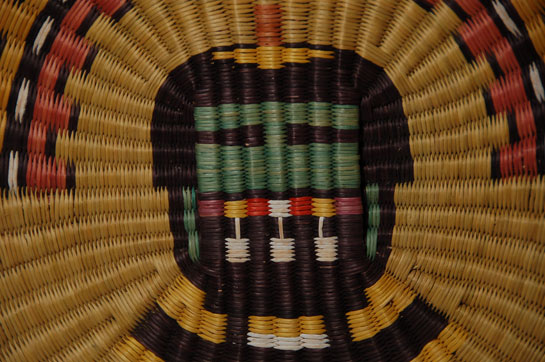Hopi Third Mesa Wicker “Angak’china Katsina” Image Plaque [SOLD]
+ Add to my watchlist Forward to Friend
- Category: Trays and Plaques
- Origin: Hopi Pueblo, Hopituh Shi-nu-mu
- Medium: native materials
- Size: 14-1/2” diameter
- Item # C3284E SOLD
Angak'china is most often called the Long Hair Katsina because of the long flowing beard suspended from the chin of the mask. The Angak'chinas "appear in a group and sing a very melodious song which may be one of the reasons that they are such favorites...Their purpose is to bring rain, and it is said that they seldom dance without the appearance of a soft gentle rain to help the crops grow.." Wright 1973
Angak'china is accompanied by the female version called Angak'chinmana (see Item #C3284F - click here to see it now). They perform together during plaza dances.
Baskets in Hopi culture are more than utilitarian objects. Their use delves into the social structure of families and clans and religious functions. They are also made for paybacks among the Hopi for favors rendered or work accomplished. Often, a male member will bring food to extended family and the payback can be baskets which the male then is free to sell for his reimbursement. Plaques are also used by women in social dances following the Katsina dance season.
It is customary for the father of the groom, or other male member of his family, to weave all the wedding clothes of the future bride. This can take months or maybe years for all the garments and belts to be completed. Following the wedding, the bride's female family members make baskets as payback to the groom's family for the wedding clothes. The baskets should be in a quantity to equal the monetary value of the clothing given to the bride.
Condition: original condition
Provenance: from the collection of an Arizona resident
Recommended Reading: Hopi Basket Weaving: Artistry in Natural Fibers by Helga Teiwes

- Category: Trays and Plaques
- Origin: Hopi Pueblo, Hopituh Shi-nu-mu
- Medium: native materials
- Size: 14-1/2” diameter
- Item # C3284E SOLD



